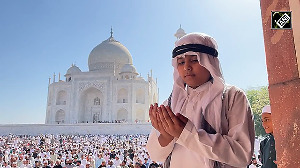
The Indian State has been far too selective about the kind of violence it punishes. And the Indian public, unfortunately, treats each case of intolerance and intimidation from the so- called Hindutva forces as isolated instances and does not take them seriously, says Sherna Gandhy.
The heinous acts of aggression committed by right-wing fascists hiding behind Hinduism, nationalism and culture, must be as vigorously confronted as left-wing violence of the Maoists, or terrorists hiding behind Islam.
While the country’s law and order machinery has learnt to deal strictly with the latter two, it is still extremely tolerant of the Ram Senas, the Hindu Rashtra Senas, the Sambhaji Brigades, the Abhinav Bharats and Durga Vahinis and other such chauvinist outfits that crawl out of the woodwork from time to time to do nothing but stir up communal trouble, and get away with vandalism and murder.
There are reportedly many such outfits with similar agendas. Until they commit some heinous act, we don’t even know that they exist and are busy spreading their poison.
For some reason, the Indian public at large is extremely tolerant of such obnoxious outfits and even of political parties that have come into existence by setting an agenda of scaremongering or downright hatred against any another community that is ethnically or religiously ‘different’.
If the Bharatiya Janata Party is truly the non-communal party that its members insist it is, it must crack down on these bigots before they are emboldened to carry out more attacks like the one that killed the IT professional Mohsin Shaikh in Pune.
Earlier attacks, in Malegaon in Maharashtra, Mecca Masjid in Hyderabad, Ajmer Sharif and the Samjhauta Express, said to be the handwork of similar outfits, have been casually treated and no convictions have resulted as they wind their way through the labyrinthine legal system.
Unlike the Congress that always soft-pedalled the issue because it was afraid of losing its Hindu vote bank, the BJP has a secure enough mandate to take on such hate-mongers as it has always been quick to take on other types.
Prime Minister Narendra Modi and his government must come out openly and strongly in condemnation of such crimes and the outfits that commit them and often claim some connection to the BJP.
Modi may be ‘pained’ at the murder, as he declared on Wednesday, but that isn’t enough.
He must show that he will not tolerate violence by any group and the atrocity committed by the Hindu Rashtra Sena, coming so soon after he took over as the great harbinger of change, would be a good test case.
Moreover, having taunted the Congress for being ‘pseudo-secular’, the BJP must now demonstrate to us what it is to be ‘secular’.
The Indian State has been far too selective about the kind of violence it punishes. And the Indian public, unfortunately, treats each case of intolerance and intimidation from the so- called Hindutva forces as isolated instances and does not take them seriously.
If one puts together all the book bans, painting burnings, vandalism of movie theatres, attacks on women and members of minority communities, muzzling of dissident voices etc, in the name of ‘culture’ and ‘religion’, the tally will be a formidable one.
The State has not just been zealous but over-zealous when it comes to what is called Islamic terrorism and Maoist terrorism, where even mildly expressed sympathy for these causes has been dealt with stringently and outfits espousing these causes have been banned.
The crackdown on the equally disgusting and damaging right-wing outfits must follow suit.
To hold any view -- fascist, chauvinist or whatever -- is fine. I would even say one has the right to voice these views in a sensible way.
But it is unacceptable to break the law and use violence to put across the point.
This country has been disunited for such a long part of its history that thinking of ourselves as one is difficult. There is also the historical burden of the Hindu caste system that is based entirely on social and economic exclusion, of an order more extreme than the apartheid of old in South Africa.
It is much easier for most Indians to think about excluding rather than including. The state of Andhra Pradesh is the latest example of this tendency. The two halves have been unable to live together in the 50-odd years they were made to coexist, and many agitations, bloodied noses and lost lives later, they have separated, still spewing hatred at each other.
When it comes to communal, caste, religious, ethnic differences, this country really needs to grow up.
We all need to stop behaving like warring tribes. At international fora we love to boast of being a modern democracy but at home, attitudes are still medieval, patriarchal and tribalistic. Anything but democratic.
The impetus and leadership to change must come from politics, since it is politicians who have a history of manipulating these sentiments to suit themselves.
The great change in India will come from here, and not from more liberal labour laws or more nuclear power or greater industrialisation or higher economic growth, which are mistakenly seen as being the great game-changers.











 © 2025
© 2025